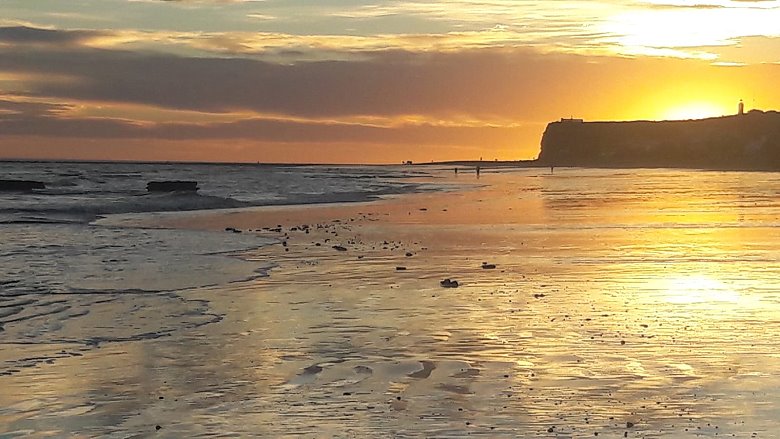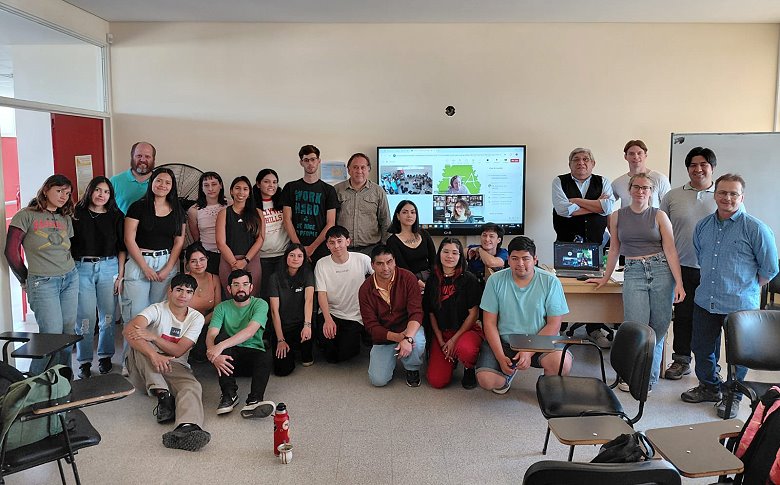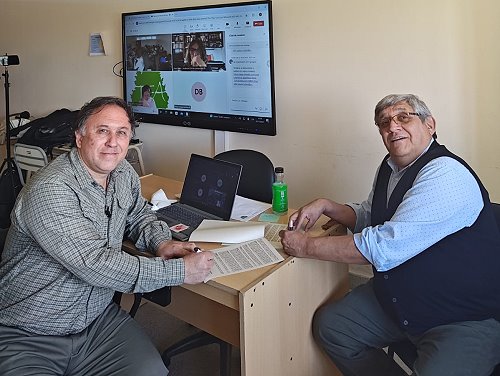The event on November 4, 2025 began with remarks by Diego Birochio, Director of the Environmental Science Programme at the Atlantic Campus of the National University of Río Negro. He introduced the hybrid-format activity as a joint effort between Fundación T.E.A. – Trabajo, Educación, Ambiente – and Mundus maris – Sciences and Arts for Sustainability asbl. He explained that the central objective was to integrate the dimensions of education, environment, and work, promoting an interdisciplinary perspective. He highlighted the importance of bringing together law students with environmental science students, since the creation and management of protected areas require multisectoral interaction and an understanding of regulatory frameworks. He concluded by announcing that the core activity of the session would be a role-play simulation titled ‚Protecting Blue Horizons‘ developed by Mundus maris and designed to replicate the real-world process of establishing a marine protected area.
Julio Acosta, President of Fundación T.E.A., then took the floor, expanding on the mission of the organization and its long-standing commitment to linking education with the environment. He emphasized the need to train professionals capable of dialogue, negotiation, and participation in socio-environmental projects from multiple perspectives. In this context, he introduced the Ibero-American Environmental Network (REIMA A.C.) as a key strategic partner for coordinating educational and environmental efforts at a regional scale.

Playa El Cóndor – Viedma, Río Negro Province. Photo: Francisco Pereda
Next, Yordanis Puerta de Armas, Co-founder and General Director of REIMA, participated as an international guest and delivered a presentation on the network’s history and mission. He explained that REIMA emerged in 1999 as a student initiative that has since expanded to 35 countries, 50 institutions, and nearly 11,000 members. He highlighted REIMA’s efforts to promote environmental education, support student research, organize international conferences and workshops, and facilitate academic publishing through indexed journals in partnership with universities.
Julio Acosta then introduced Iliana Pisarro, Executive Director of T.E.A., who briefly explained her role during the session, as she would lead a final survey aimed at evaluating the workshop experience.
Iliana went on to introduce the main coordinator of the role-play, Marcelo Morales Yokobori, Professor and Researcher at the University of Belgrano and Vice President of Mundus maris, who offered a conceptual introduction and theoretical framework to contextualize the exercise. Marcelo addressed current ocean issues such as overfishing, pollution, and climate change, and explained the crucial role of marine protected areas in protecting and possibly regenerating biodiversity. He summarized key concepts including “fishing down the food web” and the climate impacts of bottom trawling. Marcelo highlighted the strategic importance of the Kunming–Montreal Global Biodiversity Framework, Sheila Jasanoff’s notion of knowledge co-production, and the essential role of youth participation for human security. He also explained the process behind the design of the role-play: interviews with experts for the construction of the different actor profiles and an emphasis on consensus-building despite diverging short-term interests. He hoped that ‚Protecting Blue Horizons‘ would trigger interest in safeguarding biodiversity and help use respectful dialogue more widely as an effective way to develop locally adapted solutions to the biodiversity crisis.
The workshop participants were then grouped according to the identities each group would represent. These were: a municipal authority, a scientist, an offshore wind-farm company, an industrial fisher, an artisanal fisher, and an environmental NGO. Students were provided with introductory videos and reading materials for the character to impersonate and help them prepare for their roles in the debate on the creation of a marine protected area along the coast of Chubut, Argentina.

Workshop participants
The deliberations revealed a notable diversity of interests among the actors, while also showing a fundamental point of agreement: the need to conserve the Argentine hake (Merluccius hubbsi) and to restore marine ecosystems. Several central tensions emerged during the exchange, such as the debate over installing a wind farm within the marine protected area, the divide between artisanal and industrial fishing, and the contrast between economic rhythms, which demand rapid outcomes, and ecological rhythms, which require longer timescales for natural recovery. In this way, the classroom setting reflected real-world dynamics involved in taking steps toward sustainability.
Despite the differences, valuable contributions emerged:
- the proposal to move toward zoning that allows for compatible resource uses;
- the idea of establishing independent monitoring to strengthen transparency;
- the possibility of granting temporary subsidies during the transition period; and
- an emphasis on maintaining mechanisms for citizen participation.
Taken together, the exercise proved to be an opportunity to practise active listening, negotiation, and multisectoral dialogue —all essential elements for building consensus in complex contexts.
At the close of the workshop, Iliana Pisarro highlighted the educational value of the role-play, emphasizing that its greatest strength lies in requiring students to adopt positions contrary to their own convictions. In her view, the activity pushes participants out of their comfort zone, encourages understanding of others’ motivations, and develops consensus-building skills essential for socio-environmental decision-making.
María Ester Pi de la Serra, Secretary of Fundación T.E.A., placed the experience within a broader context, reminding participants of the importance of Argentina maintaining an active presence at COP30. She warned that absence from these international spaces may limit access to environmental financing and strategic opportunities. She invited students to learn about and support the initiative promoted by civil society organizations to strengthen the country’s representation in that forum.
Patricio Solimano, Research Secretary at the Atlantic Campus of the National University of Río Negro, praised the high technical and conceptual level demonstrated by the students. He compared the workshop to real processes of designing and managing protected areas in Patagonia, noting that the dynamics of the exercise accurately reflected the complexity of territorial conflicts. He also stressed the need to strengthen collegiate management spaces and to understand the fundamental role of NGOs and civil society.

Marcelo L. Morales Yokobori (left) and Julio Acosta signing the Memorandum of Understanding (MoU)
At the institutional level, Julio Acosta underscored the importance of the global environmental agenda and of promoting the participation of students and organizations at COP30 in Belém, Brazil. He emphasized that coordination among education, environmental policy, and citizen participation are essential for influencing international debates.
Marcelo L. Morales Yokobori recognized the students’ motivated and in-depth participation and stressed the importance of adopting an international perspective when analyzing ecological and environmental issues.
Finally, Diego Birochio congratulated the students for the academic level and mutual respect demonstrated throughout the discussion. He highlighted the importance of learning to debate with empathy and solid conceptual preparation — skills essential for professional engagement in real environmental conflicts. He described the activity as a starting point for building learning spaces that foster dialogue, critical thinking, and responsible participation.
As a concluding act, a cooperation agreement between Fundación T.E.A. and Mundus maris was signed during the event, formalized by Julio Acosta, President, and Marcelo L. Morales Yokobori, Vice President, respectively.
Text by Marcelo L. Morales Yokobori.
